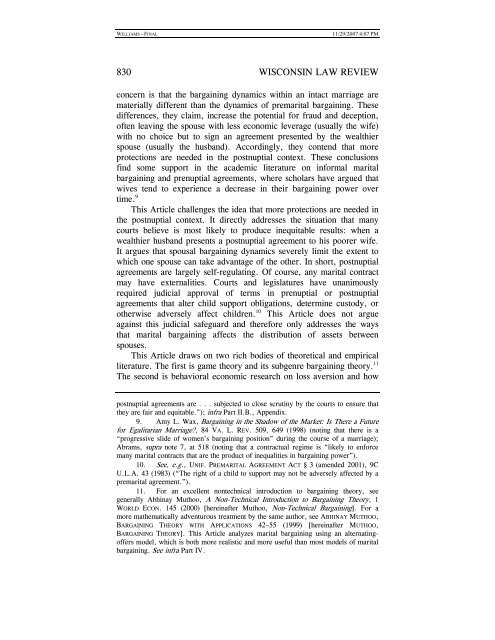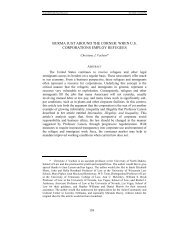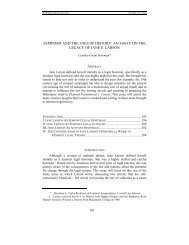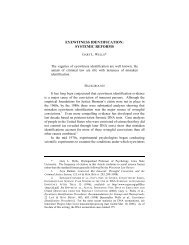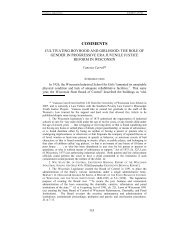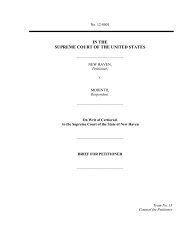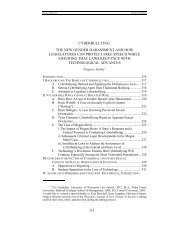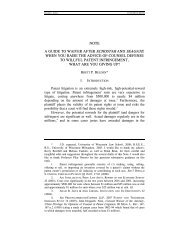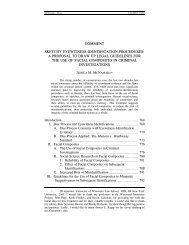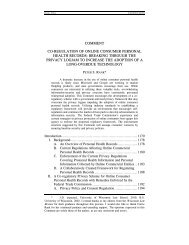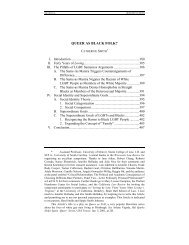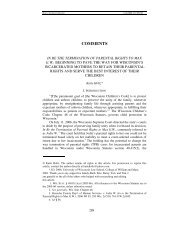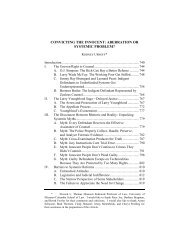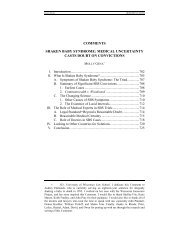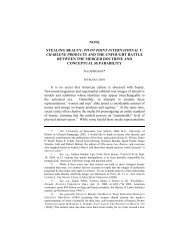POSTNUPTIAL AGREEMENTS - UW Law School
POSTNUPTIAL AGREEMENTS - UW Law School
POSTNUPTIAL AGREEMENTS - UW Law School
Create successful ePaper yourself
Turn your PDF publications into a flip-book with our unique Google optimized e-Paper software.
WILLIAMS - FINAL 11/29/2007 4:07 PM<br />
830 WISCONSIN LAW REVIEW<br />
concern is that the bargaining dynamics within an intact marriage are<br />
materially different than the dynamics of premarital bargaining. These<br />
differences, they claim, increase the potential for fraud and deception,<br />
often leaving the spouse with less economic leverage (usually the wife)<br />
with no choice but to sign an agreement presented by the wealthier<br />
spouse (usually the husband). Accordingly, they contend that more<br />
protections are needed in the postnuptial context. These conclusions<br />
find some support in the academic literature on informal marital<br />
bargaining and prenuptial agreements, where scholars have argued that<br />
wives tend to experience a decrease in their bargaining power over<br />
time. 9<br />
This Article challenges the idea that more protections are needed in<br />
the postnuptial context. It directly addresses the situation that many<br />
courts believe is most likely to produce inequitable results: when a<br />
wealthier husband presents a postnuptial agreement to his poorer wife.<br />
It argues that spousal bargaining dynamics severely limit the extent to<br />
which one spouse can take advantage of the other. In short, postnuptial<br />
agreements are largely self-regulating. Of course, any marital contract<br />
may have externalities. Courts and legislatures have unanimously<br />
required judicial approval of terms in prenuptial or postnuptial<br />
agreements that alter child support obligations, determine custody, or<br />
otherwise adversely affect children. 10 This Article does not argue<br />
against this judicial safeguard and therefore only addresses the ways<br />
that marital bargaining affects the distribution of assets between<br />
spouses.<br />
This Article draws on two rich bodies of theoretical and empirical<br />
literature. The first is game theory and its subgenre bargaining theory. 11<br />
The second is behavioral economic research on loss aversion and how<br />
postnuptial agreements are . . . subjected to close scrutiny by the courts to ensure that<br />
they are fair and equitable.”); infra Part II.B., Appendix.<br />
9. Amy L. Wax, Bargaining in the Shadow of the Market: Is There a Future<br />
for Egalitarian Marriage?, 84 VA. L. REV. 509, 649 (1998) (noting that there is a<br />
“progressive slide of women’s bargaining position” during the course of a marriage);<br />
Abrams, supra note 7, at 518 (noting that a contractual regime is “likely to enforce<br />
many marital contracts that are the product of inequalities in bargaining power”).<br />
10. See, e.g., UNIF. PREMARITAL AGREEMENT ACT § 3 (amended 2001), 9C<br />
U.L.A. 43 (1983) (“The right of a child to support may not be adversely affected by a<br />
premarital agreement.”).<br />
11. For an excellent nontechnical introduction to bargaining theory, see<br />
generally Abhinay Muthoo, A Non-Technical Introduction to Bargaining Theory, 1<br />
WORLD ECON. 145 (2000) [hereinafter Muthoo, Non-Technical Bargaining]. For a<br />
more mathematically adventurous treatment by the same author, see ABHINAY MUTHOO,<br />
BARGAINING THEORY WITH APPLICATIONS 42–55 (1999) [hereinafter MUTHOO,<br />
BARGAINING THEORY]. This Article analyzes marital bargaining using an alternatingoffers<br />
model, which is both more realistic and more useful than most models of marital<br />
bargaining. See infra Part IV.


